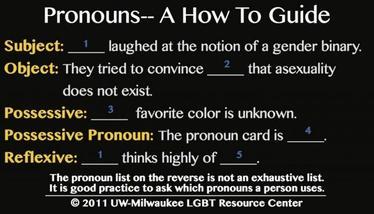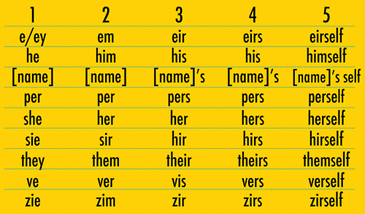What is a “personal pronoun?”
A personal pronoun is the pronoun(s) a person uses for themself and how others should refer to that individual.
Why should we normalize asking and using personal pronouns?
Pronouns are necessary for communicating with and about each other. Building more opportunities to share our own pronouns and asking others for their pronouns creates more inclusive and affirming spaces for everyone, especially queer & trans+/ gender non-conforming individuals.
How do I get used to using personal pronouns?
PRACTICE! Mispronouning someone is a microaggression and the best way to avoid causing unintended harm to a student, friend, or colleague is to commit yourself to getting it right. Check out this “how to guide” to get started.


How do I appropriately introduce my pronouns to others?
DO… specifically say which set(s) of pronouns you use. Ex: she/her/hers, they/them/their, etc.
DO… include pronouns on business cards, email signatures, nametags, etc. Promote this to your peers.
DO NOT… refer to your pronouns as “gender pronouns.” Pronouns are not gendered and do not directly correlate with a specific gender.
DO NOT …. say “my preferred pronouns are…” Unless you use multiple sets of pronouns and have a preference, or lack of preference, it is not appropriate to refer to personal pronouns as a preference. They are mandatory.
DO NOT… say you use “masculine/male” or “feminine/female” pronouns. Personal pronouns are not directly associated with a specific gender.
How do I ask someone what pronouns they use?
DO.... be willing to introduce yourself with your own personal pronouns if possible.
DO… ask “What are your pronouns?” or “What pronouns would you like used in this space?”
DO … include personal pronouns in group and/or first time introductions to create a climate where it is okay to disclose personal pronouns. Repeat often.
DO NOT… force it. Some folks may not feel safe sharing pronouns depending on the situation or their personal comfort. Create the space, not the expectation.
DO NOT…. imply that you cannot tell what pronouns someone uses based on their gender expression/appearance OR only ask individuals who you think may possibly use alternative pronouns. Normalize this practice and ask everyone just to be sure.
What if I make a mistake?
DO…. acknowledge the mistake, correct yourself in the moment, apologize, and carry on.
DO NOT… apologize excessively, drawing a lot of attention to the error. This could result in the person who has been mispronouned consoling you instead.
DO NOT…. try justifying your mistake. For example, phrases like “I’m working on it” or “I’m trying” can be perceived as though using someone’s pronouns is an inconvenience to you.